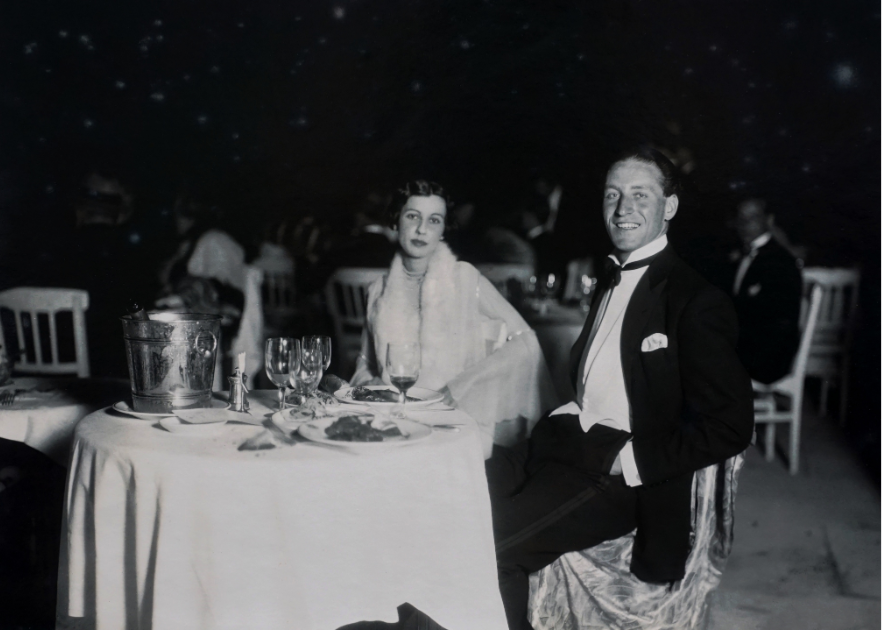My Greatest Generation grandad had one rule to never run out of things to say in conversation
It's incredibly basic, but too many people forget it.
Manners and social etiquette have changed over the years, but the classics still work.
My grandad was, simply put, the man. He fought in World War II, lived into his 90s with the strength and vigor of a much younger man, and made an unforgettable impression on everyone who knew him. He was truly a force of nature that I was lucky to have in my life.
He was also a highly quotable man, full of incredible one-liners. When my family would visit and he was ready to wrap things up, he'd cheekily say, "Well, we certainly have seen you," and, "Come again when you can't stay so long."
My Greatest Generation grandad also loved to entertain. Though not a man of many words, he was a legendary host. His advice to us grandkids about being a great conversationalist was always the same:
"Always ask the last question."

That was it. That was his key to never running out of things to say in a conversation. It sounds extremely obvious, but you'd be surprised how counter it runs to a lot of the advice young people are getting now. In certain sectors, the name of the game is all about how to be more charming and more charismatic. "Self-help" forgets that the real key to being interesting is being interested in what the other party has to say.
What made my grandad's execution of this simple concept great was his confidence in the fact that they didn't have to be great questions. He would just keep asking them, like a steamroller. He knew that, if he kept it up, he'd eventually hit on something that would launch a deeper and more interesting discussion.
Conversations began logistically: How was the drive? What time did you leave? Was there any traffic? Where'd you stop to eat? What did you order? Before you knew it, you were off and running. That was the beauty of the technique.
Of course, asking questions is not new advice. It's a strategy that's been around forever, and it's still preached heavily today by psychologists and master small-talkers.
But anybody who's been in conversation with another human being lately knows that a lot of people are really bad at this and only want to hear themselves talk. The Guardian calls them "non-askers." And they're everywhere.
In 2015, Harvard Business Review shared that about 70-80% of what children say is made up of questions, but that number plummets dramatically in adults. It's like we lose our inherent curiosity somewhere along the way, and we pay for it in the way we relate to, or don't, with others. You don't have to do much research to see how big of a problem this is becoming, from people lamenting horrid first dates where they can't get a word in edgewise, to an excruciating lack of self-awareness from people in the working world who just...won't. stop. talking.

Why is this simple advice so hard to follow?
In Quiet: The Power of Introverts in a World That Can't Stop Talking, author Susan Cain writes that the idea of "having a good personality" is a pretty modern invention. She says that the Western world transformed at some point from a culture of character to a culture of personality, timed around the rise of salesmen and the corporate world. In that burgeoning culture, being charming, charismatic, and a great storyteller was crucial to your success.
We think it makes us impressive to know all the answers, have the best stories, anecdotes, or fun facts to share about every topic. In fact, appearing that way can often be the key to getting ahead at work and making more money. We want to be the one holding court at a party, making guests laugh with our clever jokes and monologues, because we equate that image with popularity, success, and belonging.
- YouTube youtu.be
But it wasn't always this way. My grandad came from a time in the old South where good etiquette and manners were more important than being incredibly charming.
In the late 1800s, Professor Thomas E. Hill wrote in The Essential Handbook of Victorian Etiquette, "Do not aspire to be a great storyteller. An inveterate teller of long stories becomes very tiresome. To tell one or two witty, short, new stories, appropriate to the occasion, is about all that one person should inflict upon the company."
Etiquette of the era also dictated not bragging about your connections or accomplishments, and not using highfalutin words to sound smarter than you really are. Some funny ones include parents not telling too many stories about their kids (preach!) and avoiding using too many puns.
Now, my grandad didn't exactly grow up in Victorian England—more like Great Depression-era America—but you can get a sense of how our priorities have changed since 1900 to today. There were a lot of things about that time period in the United States that weren't so great, but that emphasis on making other people feel comfortable and heard in social settings instead of advancing your own status and standing, would be a welcome return. Luckily, it's easy to do it even today. Just ask a question, literally any question, and you'll already be doing way better than most people.
They don't call them the Greatest Generation for nothing!

This article originally appeared in July.

